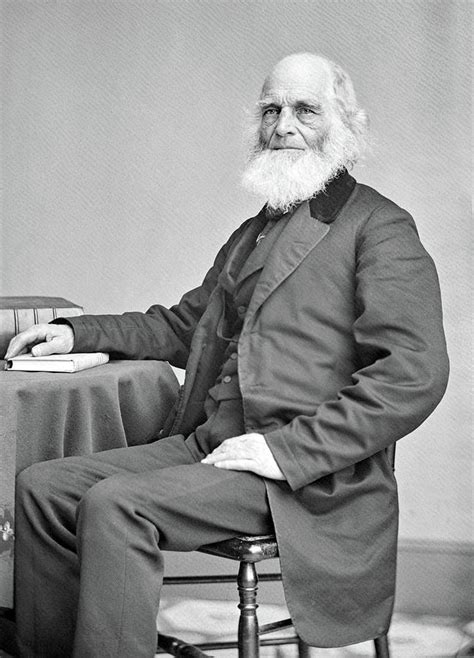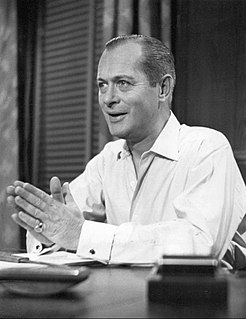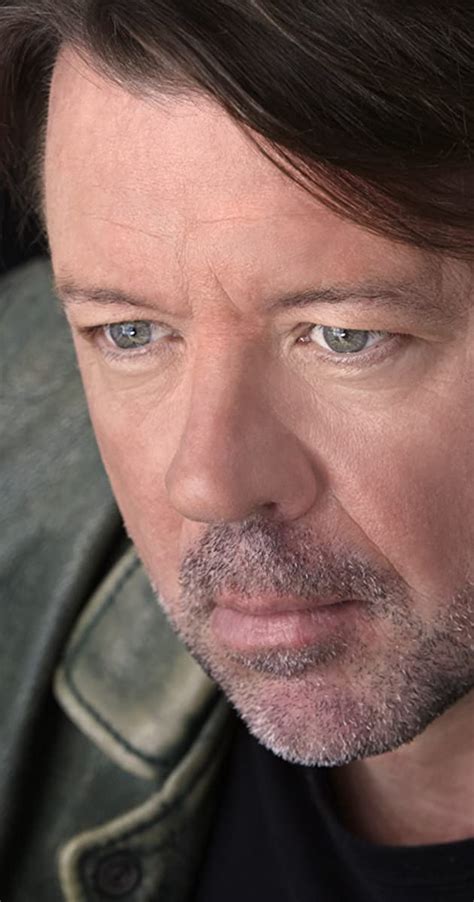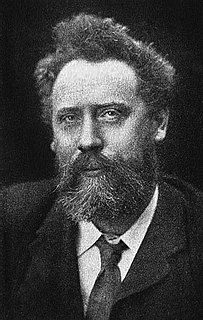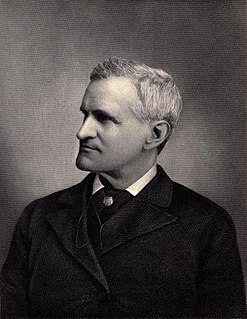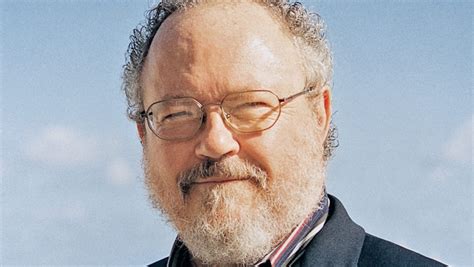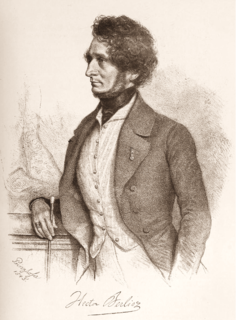Top 676 Doom And Gloom Quotes & Sayings - Page 11
Explore popular Doom And Gloom quotes.
Last updated on April 21, 2025.
However baby man may brag of his science and skill, and however much, in a flattering future, that science and skill may augment; yet for ever and for ever, to the crack of doom, the sea will insult and murder him, and pulverize the stateliest, stiffest frigate he can make; nevertheless, by the continual repetition of these very impressions, man has lost that sense of the full awfulness of the sea which aboriginally belongs to it.
An infant prodigy of nine is shoved upon the stage in white. She starts off in a dismal whine about a dark and stormy night, a burglar, whose heart is true, despite his wicked-looking face, who puts the little child in doom, to save her mamma's jewel case. This may bring tears to every eye; it does not set my heart on fire. I'd like to stand serenely by and watch that horrid child expire.
When I worked at Microsoft, I got to go and visit a bunch of different companies. Probably a hundred different companies a year. You'd see all the different ways they'd work. The guys who did Ventura Publisher one day, and then United Airlines the next. You'd see the 12 guys in Texas doing Doom, and then you'd go see Aetna life insurance.
Golf cannot be played in anger, or in any mood of emotiional excess. Half the golf balls struck by amateurs are hit if not in rage surely in bewilderment, or gloom, or in cynicism, or even hysterically - all of those emotional excesses must be contained by the professional. Which is why balance is one of the essential ingredients of golf. Professionals invariably trudge phlegmatically around the course - whatever emotions are seething within - with the grim yet placid and bored look of cowpokes, slack-bodied in their saddles, who have been tending the same herd for two months.
She wanted an Angel of Music . . . an angel who would make her believe in herself at last. I'd been the Angel of Doom for the khanum. There was no reason in the world why I could not be the Angel of Music for Christine. I couldn't hope to be a man to her, I couldn't ever be a real, breathing, living man waking at her side and reaching out for her . . . But I could be her angel' -Erik
This hour in history needs a dedicated circle of transformed nonconformists. Our planet teeters on the brink of annihilation; dangerous passions of pride, hatred, and selfishness are enthroned in our lives; and men do reverence before false gods of nationalism and materialism. The saving of our world from pending doom will come, not through the complacent adjustment of the conforming majority, but through the creative maladjustment of a nonconforming minority.
My Friend: Art thou abroad on this stormy night on thy journey of love, my friend? The sky groans like one in despair. I have no sleep tonight. Ever and again I open my door and look out on the darkness, my friend! I can see nothing before me. I wonder where lies thy path! By what dim shore of the ink-black river, by what far edge of the frowning forest, through what mazy depth of gloom art thou threading thy course to come to me, my friend?
Give heed to the cause of the holy Roman Church, mother of all churches and teacher of the faith, whom you by the order of God, have consecrated by your blood. Against the Roman Church, you warned, lying teachers are rising, introducing ruinous sects, and drawing upon themselves speedy doom. Their tongues are fire, a restless evil, full of deadly poison. They have bitter zeal, contention in their hearts, and boast and lie against the truth.
The country ever has a lagging Spring,
Waiting for May to call its violets forth,
And June its roses-showers and sunshine bring,
Slowly, the deepening verdure o'er the earth;
To put their foliage out, the woods are slack,
And one by one the singing-birds come back.
Within the city's bounds the time of flowers
Comes earlier. Let a mild and sunny day,
Such as full often, for a few bright hours,
Breathes through the sky of March the airs of May,
Shine on our roofs and chase the wintry gloom-
And lo! our borders glow with sudden bloom.
Yes?’ he asked, looking at me over the sheet. ‘I’m a writer temporarily down on my inspirations.’ ‘Oh, a writer, eh?’ ‘Yes.’ ‘Are you sure?’ ‘No, I’m not.’ ‘What do you write?’ ‘Short stories mostly. And I’m halfway through a novel.’ ‘A novel, eh?’ ‘Yes.’ ‘What’s the name of it?’ ‘”The Leaky Faucet of My Doom.”‘ ‘Oh, I like that. What’s it about?’ ‘Everything.’ ‘Everything? You mean, for instance, it’s about cancer?’ ‘Yes.’ ‘How about my wife?’ ‘She’s in there too.
Books fall open, you fall in, delighted where you've never been; hear voices not once heard before, reach world on world through door on door; find unexpected keys to things locked up beyond imaginings. What might you be, perhaps become, because one book is somewhere? Some wise delver into wisdom, wit, and wherewithal has written it. True books will venture, dare you out, whisper secrets, maybe shout across the gloom to you in need, who hanker for a book to read.
An old Arabian fable tells of a prince imprisoned in a castle which had thirteen windows. Twelve of these windows overlooked lovely scenes, while the thirteenth looked down on the black ash heaps of the city. Ignoring the twelve windows, the prince always looked out through the thirteenth. It is so often true that whether a person carries with him an atmosphere of gloom and depression or one of confidence and courage depends on his individual outlook.
So what rhyming poems do is they take all these nearby sound curves and remind you that they first existed that way in your brain. Before they meant something specific, they had a shape and a way of being said. And now, yes, gloom and broom are floating fifty miles away from each other in you mind because they refer to different notions, but they're cheek-by-jowl as far as your tongue is concerned. And that's what a poem does. Poems match sounds up the way you matched them when you were a tiny kid, using that detachable front phoneme.
Early on a difficult climb, especially a solo climb, you’re hyper-aware of the abyss pulling at your back, constantly feeling its call, its immense hunger. To resist takes tremendous conscious effort, you don’t dare let your guard down for an instant. The void puts you on edge, makes your movements tentative and clumsy. But as the climb continues, you grow accustomed to the exposure, you get used to rubbing shoulders with doom, you come to believe in the reliability of your hands and feet and head. You learn to trust your self-control.
In every Christian's Heart, there is a cross and a throne, and the Christian is on the throne till he puts himself on the cross; if he refuses the cross, he remains on the throne. Perhaps this is at the bottom of the backsliding and worldliness among Gospel believers today. We want to be saved, but we insist that Christ do all the dying. No cross for us, no dethronement, no dying. We remain king within the little kingdom of man's soul and wear our tinsel crown with all the pride of a caesar; but we doom ourselves to shadows and weakness and spiritual sterility.
Each state of the human mind has some parable in the physical creation by which it is shadowed forth; nor is it only artists and poets, but even the most abstract thinkers that have drawn from this source. Lively activity we name fire; time is a stream that rolls on, sweeping all before it; eternity is a circle; a mystery is hid in midnight gloom, and truth dwells in the sun. Nay, I begin to believe that even the future destiny of the human race is prefigured in the dark oracular utterances of bodily creation.
A thunder-storm!—the eloquence of heaven, When every cloud is from its slumber riven, Who hath not paused beneath its hollow groan, And felt Omnipotence around him thrown? With what a gloom the ush’ring scene appears! The leaves all shiv’ring with instinctive fears, The waters curling with a fellow dread, A veiling fervour round creation spread, And, last, the heavy rain’s reluctant shower, With big drops patt’ring on the tree and bower, While wizard shapes the bowing sky deform,— All mark the coming of the thunder-storm!
What did Doctor Doom really want? He wanted to rule the world. Now, think about this. You could walk across the street against a traffic light and get a summons for jaywalking, but you could walk up to a police officer and say "I want to rule the world," and there's nothing he can do about it, that is not a crime. Anybody can want to rule the world. So, even though he was the Fantastic Four's greatest menace, in my mind, he was never a criminal!
If Under fell, if Over leaped, If death was life and Death life reaped, Something rises from the gloom, To make the Underland a tomb Hear it scratching down below, Rat of long forgotten snow, Evil cloaked in coat of White, Will the Warrior drain your light? What could turn the Warrior week? What do burning Gnawers seek? Just a barely speaking pup That holds the Land of Under up Die the baby, die his heart Die his most essential part Die the peace that rules the hour, Gnawers have their key to power
Mirabelle replaces the absent friends with books and television mysteries of the PBS kind. The books are mostly nineteenth-century novels in which women are poisoned or are doing the poisoning. She does not read these books as a romantic lonely hearts turning pages in the isolation of her room, not at all. She is instead an educated spirit with a sense of irony. She loves the gloom of these period novels, especially as kitsch, but beneath it all she finds that a part of her indentifies with all that darkness.
So the Dark did a simple thing. They showed the maker of the sword his own uncertainty and fear. Fear of having done the wrong thing--fear that having done this one great thing, he would never again be able to accomplish anything of great worth--fear of age, of insufficiency, of unmet promise. All such great fears, that are the doom of people given the gift of making, and lie always somewhere in their minds.
As the original 'Mary Poppins' budget of five million dollars continued to grow, I never saw a sad face around the entire Studio. And this made me nervous. I knew the picture would have to gross 10 million dollars for us to break even. But still there was no negative head-shaking. No prophets of doom. Even Roy was happy. He didn't even ask me to show the unfinished picture to a banker. The horrible thought struck me - suppose the staff had finally conceded that I knew what I was doing.
I shall venture to affirm, that there never was a popular religion, which represented the state of departed souls in such a light,as would render it eligible for human kind, that there should be such a state. These fine models of religion are the mere product of philosophy. For as death lies between the eye and the prospect of futurity, that event is so shocking to nature, that it must throw a gloom on all the regions which lie beyond it; and suggest to the generality of mankind the idea of Cerberus and Furies; devils, and torrents of fire and brimstone.
A primatologist told me you can find love in the eyes of an orangutan. It's that old primate gleam that goes back thousands of years and can penetrate the deepest gloom of the jungle. Nothing can deter that gleam, which is why we primates have survived for so long to meet and procreate. In prison, the survival of romance is not easy, but it finds a way ... In Canada, there has been a succession of romances between prisoners and female guards, nurses, librarians, and one Catholic nun who married the convict after he divorced his wife.
Claudia Rankine's Citizen comes at you like doom. It's the best note in the wrong song that is America. Its various realities-'mistaken' identity, social racism, the whole fabric of urban and suburban life-are almost too much to bear, but you bear them, because it's the truth. Citizen is Rankine's Spoon River Anthology, an epic as large and frightening and beautiful as the country and various emotional states that produced it.
If we really believed that those who are gone from us were as truly alive as ourselves, we could not invest the subject with such awful depth of gloom as we do. If we could imbue our children with distinct faith in immortality, we should never speak of people as dead, but passed into another world. We should speak of the body as a cast-off garment, which the wearer had outgrown; consecrated indeed by the beloved being that used it for a season, but of no value within itself.
A great dread fell on him, as if he was awaiting the pronouncement of some doom that he had long foreseen and vainly hoped might after all never be spoken. An overwhelming longing to rest and remain at peace by Bilbo's side in Rivendell filled all his heart. At last with an effort he spoke, and wondered to hear his own words, as if some other will was using his small voice. "I will take the Ring," he said, "though I do not know the way.
Let us contemplate our forefathers, and posterity, and resolve to maintain the rights bequeathed to us from the former, for the sake of the latter. The necessity of the times, more than ever, calls for our utmost circumspection, deliberation, fortitude and perseverance. Let us remember that "if we suffer tamely a lawless attack upon our liberty, we encourage it, and involve others in our doom," it is a very serious consideration that millions yet unborn may be the miserable sharers of the event.
We really have no choice but to pray and encourage a return to an America steeped in Judeo-Christian values. It is either that or taking our chances in a society with no values at all. For all Americans the former carries certain risks, but the latter spells certain doom. For now, we should not be deflected by theological debate from the life-saving tasks awaiting us. There is work to be done. We must ensure that America will continue to be part of God's plan for the world.
Love, which is lust, is the Lamp in the Tomb.
Love, which is lust, is the Call from the Gloom.
Love, which is lust, is the Main of Desire.
Love, which is lust, is the Centric Fire.
So man and woman will keep their trust,
Till the very Springs of the Sea run dust.
Yea, each with the other will lose and win,
Till the very Sides of the Grave fall in.
For the strife of Love's the abysmal strife,
And the word of Love is the Word of Life.
And they that go with the Word unsaid,
Though they seem of the living, are damned and dead.
While the poet entertains he continues to search for eternal truths, for the essence of being. In his own fashion he tries to solve the riddle of time and change, to find an answer to suffering, to reveal love in the very abyss of cruelty and injustice. Strange as these words may sound I often play with the idea that when all the social theories collapse and wars and revolutions leave humanity in utter gloom, the poet--whom Plato banned from his Republic--may rise up to save us all.
Wimsey stooped for an empty sardine-tin which lay, horribly battered, at his feet, and slung it idly into the quag. It struck the surface with a noice like a wet kiss, and vanished instantly. With that instinct which prompts one, when depressed, to wallow in every circumstance of gloom, Peter leaned sadly against the hurdles and abandoned himself to a variety of shallow considerations upon (1) The vanity of human wishes; (2) Mutability; (3) First love; (4) The decay of idealism; (5) The aftermath of the Great war; (6) Birth-control; and (7) The fallacy of free-will.
Never allow anyone to rain on your parade and thus cast a pall of gloom and defeat on the entire day. Remember that no talent, no self-denial, no brains, no character, are required to set up in the fault-finding business. Nothing external can have any power over you unless you permit it. Your time is too precious to be sacrificed in wasted days combating the menial forces of hate, jealously, and envy. Guard your fragile life carefully. Only God can shape a flower, but any foolish child can pull it to pieces.
[All the ancient wisdom] tells us that work is necessary to us, as much a part of our condition as mortality; that good work is our salvation and our joy; that shoddy or dishonest or self-serving work is our curse and our doom. We have tried to escape the sweat and sorrow promised in Genesis - only to find that, in order to do so, we must forswear love and excellence, health and joy. (pg. 44, "The Unsettling of America")
Some dangers are so spectacular and so much beyond normal experience that the mind refuses to accept them as real, and watches the approach of doom without any sense of apprehension. The man who looks at the onrushing tidal wave, the descending avalanche, or the spinning funnel of the tornado, yet makes no attempt to flee, is not necessarily paralyzed with fright or resigned to an unavoidable fate. He may simply be unable to believe that the message of his eyes concerns him personally. It is all happening to somebody else.
After a pause, he asked, 'What do you think of Nasuada's plans?' 'Mmm...she's doomed! You're doomed! They're all doomed!'She cackled, doubling over, then straightened abruptly. 'notice I didn't specify what kind of doom, so no matter what happens, I predicted it. How very wise of me.' She lifted the basket again, setting it on one hip. 'I supposed I won't see you for a while, so farewell, best of luck, avoid roasted cabbage, don't eat earwax, and look on the bright side of life!' And with a cheery wink, she strolled off, leaving Eragon blinking and nonplussed.
The world worlds, and is more fully in being than the tangible and perceptible realm in which we believe ourselves to be at home...By the opening up of a world, all things gain their lingering and hastening, their remoteness and nearness, their scope and limits. In a world's worlding is gathered that spaciousness out of which the protective grace of the gods is granted and withheld. Even this doom of the god remaining absent is a way in which the world worlds...All coming to presence...keeps itself concealed to the last.
His whole being radiates a pure, wild sweetness, flitting through night woods with little melodious cries, on some cryptic errand. There is also an aura of doom and sadness about this trusting little creature. He has been abandoned many times over the centuries, left to die in cold city alleys, in hot noon vacant lots, pottery shards, nettles, crumbled mud walls. Many times he has cried for help in vain.
Those that think that wealth is the proper thing for them cannot give up their revenues; those that seek distinction cannot give up the thought of fame; those that cleave to power cannot give the handle of it to others. While they hold their grasp of those things, they are afraid of losing them. When they let them go, they are grieved and they will not look at a single example, from which they might perceive the folly of their restless pursuits - such men are under the doom of heaven.
...a condemned man who, at the hour of death, says or thinks that if the alternative were offered him of existing somewhere, on a height of rock or some narrow elevation, where only his two feet could stand, and round about him the ocean, perpetual gloom, perpetual solitude, perpetual storm, to remain there standing on a yard of surface for a lifetime, a thousand years, eternity! - rather would he live thus than die at once? Only live, live, live! - no matter how, only live!
Spirit of BEAUTY, that dost consecrate With thine own hues all thou dost shine upon Of human thought or form, where art thou gone? Why dost thou pass away and leave our state, This dim vast vale of tears, vacant and desolate? Ask why the sunlight not for ever Weaves rainbows o'er yon mountain-river, Why aught should fail and fade that once is shown, Why fear and dream and death and birth Cast on the daylight of this earth Such gloom, why man has such a scope For love and hate, despondency and hope?
We say, then, that Scripture clearly proves this much, that God by his eternal and immutable counsel determined once for all those whom it was his pleasure one day to admit to salvation, and those whom, on the other hand, it was his pleasure to doom to destruction. We maintain that this counsel, as regards the elect, is founded on his free mercy, without any respect to human worth, while those whom he dooms to destruction are excluded from access to life by a just and blameless, but at the same time incomprehensible judgment
The monk, the inquisitor, and the Jesuit were lords of Spain,- sovereigns of her sovereign, for they had formed the dark and narrow mind of that tyrannical recluse. They had formed the minds of her people, quenched in blood every spark of rising heresy, and given over a noble nation to a bigotry blind and inexorable as the doom of fate. Linked with pride, ambition, avarice, every passion of a rich, strong nature, potent for good and ill, it made the Spaniard of that day a scourge as dire as ever fell on man.
Only a catastrophe gets our attention. We want them, we depend on them. As long as they happen somewhere else. This is where California comes in. Mud slides, brush fires, coastal erosion, mass killings, et cetera. We can relax and enjoy these disasters because in our hearts we feel that California deserves whatever it gets. Californians invented the concept of life-style. This alone warrants their doom.
We rarely get to prepare ourselves in meadows or on graveled walks; we do it on short notice in places without windows, hospital corridors, rooms like this lounge with its cracked plastic sofa and Cinzano ashtrays, where the cafe curtains cover blank concrete. In rooms like this, with so little time, we prepare our gestures, get them by heart so we can do them when we're frightened in the face of Doom.
When men evaluate each other as men, they still look for the same virtues that they'd need to keep the perimeter. Men respond to and admire the qualities that would make men useful and dependable in an emergency. Men have always had a role apart, and they still judge one another according to the demands of that role as a guardian in a gang struggling for survival against encroaching doom. Everything that is specifically about being a man-not merely a person-has to do with that role.
Every person has the power to make others happy. Some do it simply by entering a room others by leaving the room. Some individuals leave trails of gloom; others, trails of joy. Some leave trails of hate and bitterness; others, trails of love and harmony. Some leave trails of cynicism and pessimism; others trails of faith and optimism. Some leave trails of criticism and resignation; others trails of gratitude and hope. What kind of trails do you leave?
Not understanding the process of a spontaneously-ordered economy goes hand-in-hand with not understanding the creation of resources and wealth. And when a person does not understand the creation of resources and wealth, the only intellectual alternative is to believe that increasing wealth must be at the cost of someone else. This belief that our good fortune must be an exploitation of others may be the taproot of false prophecy about doom that our evil ways must bring upon us.
All these relics gave... Thornfield Hall the aspect of a home of the past: a shrine to memory. I liked the hush, the gloom, the quaintness of these retreats in the day; but I by no means coveted a night's repose on one of those wide and heavy beds: shut in, some of them, with doors of oak; shaded, others, with wrought old-English hangings crusted with thick work, portraying effigies of strange flowers, and stranger birds, and strangest human beings, all which would have looked strange, indeed, by the pallid gleam of moonlight.
After man there would be the mighty beetle civilisation, the bodies of whose members the cream of the Great Race would seize when the monstrous doom overtook the elder world. Later, as the earth's span closed, the transferred minds would again migrate through time and space -- to another stopping place in the bodies of the bulbous vegetable entities of Mercury. But there would be races after them, clinging pathetically to the cold planet and burrowing to its horror-filled core, before the utter end.
Christmas Eve, and twelve of the clock. "Now they are all on their knees," An elder said as we sat in a flock By the embers in hearth-side ease. We pictured the meek mild creatures where They dwelt in their strawy pen, Nor did it occur to one of us there To doubt they were kneeling then. So fair a fancy few would weave In these years! yet, I feel If someone said on Christmas Eve, "Come; see the oxen kneel, In the lonely barton by yonder coomb Our childhood used to know," I should go with him in the gloom, Hoping it might be so.
Shakespeare was an intellectual ocean, whose waves touched all the shores of thought; within which were all the tides and waves of destiny and will; over which swept all the storms of fate, ambition and revenge; upon which fell the gloom and darkness of despair and death and all the sunlight of content and love, and within which was the inverted sky lit with the eternal stars -- an intellectual ocean -- toward which all rivers ran, and from which now the isles and continents of thought receive their dew and rain.
I shared a vagrant optimism that some of us were making real progress, that we had taken an honest road, and that the best of us would inevitably make it over the top. At the same time, I felt that the life we were leading was a lost cause, that we were all actor, kidding ourselves on a senseless odyssey. It was the tension between those two poles - a restless idealism on one hand and a sense of impending doom on the other - that kept me going.
Perhaps that is our doom, our human curse, to never really know one another. We erect edifices in our minds about the flimsy framework of word and deed, mere totems of the true person, who, like the gods to whom the temples were built, remains hidden. We understand our own construct; we know our own theory; we love our own fabrication. Still . . . does the artifice of our affection make our love any less real?
Not far from here, by a white sun, behind a green star, lived the Steelypips, illustrious, industrious, and they hadn't a care: no spats in their vats, no rules, no schools, no gloom, no evil influence of the moon, no trouble from matter or antimatter - for they had a machine, a dream of a machine, with springs and gears and perfect in every respect. And they lived with it, and on it, and under it, and inside it, for it was all they had - first they saved up all their atoms, then they put them all together, and if one didn't fit, why they chipped at it a bit, and everything was just fine.
Then a dog began to howl somewhere in a farmhouse far down the road, a long, agonized wailing, as if from fear. The sound was taken up by another dog, and then another and another, till, borne on the wind which now sighed softly through the Pass, a wild howling began, which seemed to come from all over the country, as far as the imagination could grasp it through the gloom of the night.
In Technologized Desire, the cultural pathologies that mark the panic ecstasy and terminal doom of the posthuman condition are powerfully rehearsed in the language of science fiction. Here, images of prosthetic subjects, zombies, cut-ups and armies of the medieval dead actually slip off the pages of literature to become the terminal hauntology of these technologized times. Technologized Desire is nothing less than a brilliant data screen of future memories. Read it well: it's a survival guide for bodies flatlined by the speed of accelerating technology.
The trees bathed their great heads in the waves of the morning, while their roots were planted deep in gloom; save where on the borders of the sunshine broke against their stems, or swept in long streams through their avenues, washing with brighter hue all the leaves over which it flowed; revealing the rich brown of the dacayed leaves and fallen pine-cones, and the delicate greens of the long grasses and tiny forests of moss that covered the channel over which it passed in the motionless rivers of light.
In my opinion, the trombone is the true head of the family of wind instruments, which I have named the 'epic' one. It possesses nobility and grandeur to the highest degree; it has all the serious and powerful tones of sublime musical poetry, from religious, calm and imposing accents to savage, orgiastic outburst. Directed by the will of the master, the trombones can chant like a choir of priests, threaten, utter gloomy sighs, a mournful lament, or a bright hymn of glory; they can break forth into awe-inspiring cries and awaken the dead or doom the living with their fearful voices.








